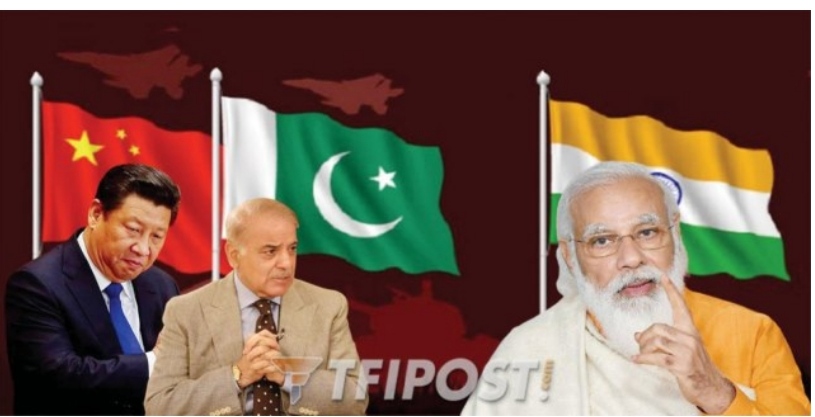China and Pakistan in Crisis – Will India seize the Leadership Opportunity?

It is fair to say that since independence, India has remained unsure of its place in the world. But all that is changing as the nation emerges and takes on a new role. The opportunity for leadership has never been greater
By Anil Madan
In past commentaries, I have alluded to the utter lack of leadership around the world. Events in Pakistan and China present India the opportunity to seize the moment. Let me explain.
When Pakistan was hit with the worst floods in recent times, India’s External Affairs Minister (the equivalent of the US Secretary of State, or Britain’s Foreign Secretary) announced a suo motu increase in India’s initial offer of aid to Pakistan. “As a more concrete assessment of the damage inflicted by this natural disaster and the urgent needs of the people of Pakistan emerges, government has decided to increase its assistance to Pakistan from USD 5 million, announced earlier, to 25 million US dollars,” said the minister. That was in 2010. Astute readers may have guessed, from the dollar amounts mentioned, that we were referring to an event some years old. How times have changed.
Pakistan has twelve years later, once again, been hit with the worst floods in recent times. UN Secretary General Antonio Guterres has described these recent floods as “climate carnage.” More than 8 million people have been displaced and the cost to rebuild is estimated at $16.3 billion. Millions of homes need to be rebuilt and hundreds of miles of roads and railways rehabilitated. Pakistan cannot self-fund the entire cost and has turned to the world for help. The push for the funding effort is “marketed” via the International Conference on Climate Resilient Pakistan, co-sponsored and hosted by the Pakistani government and the UN. Pakistan’s Prime Minister presented a strategy for climate-resilient rehabilitation and reconstruction of his nation. The good news is that the international community is reported to have committed $9 billion to the effort in aid and financing, thus meeting Pakistan’s goal.
Pakistan’s dire straits
The situation is Pakistan is dire. Aside from the physical damage and loss of housing and infrastructure, there are widespread shortages of food, millions are at risk of malaria and other diseases, and looming above all is the threat of plunging about 9 million people deeper into intractable poverty. Recently, the Pakistani government approved the purchase of 6.2 million mosquito nets from India. And, of course, in the face of the food crisis, India’s proximity makes it a critical source of food supply to Pakistan as it has been to Sri Lanka. The recent floods and Pakistan’s dire straits underscore just how dependent Pakistan is on its neighbour when it comes to crunch time.
It would seem obvious that both India and Pakistan would be well advised to put their ongoing hostility, which has become a mutually ingrained habit, behind them and learn to cooperate. The next flood may not be ten years away and there is no telling which country will be hardest hit. And as the US pulls away from Pakistan, which is courted more and more by China, geopolitical imperatives commend a more proactive approach to India when it comes to relations with Pakistan.
As India has just assumed the presidency of the G20 for 2023, it has yet another imperative to show leadership in its relations with neighboring Pakistan. At least for the next year, India is charged with responsibility for implementation of the G20’s 2030 Agenda for Sustainable Development including the so-called Sustainable Development Goals (SDGs). The first three SDGs – no poverty, zero hunger and ensuring good health – align perfectly with the challenges that Pakistan faces. And it goes without saying, that India’s own problems involve the same SDGs.
India’s role in contributing to fulfilling the SDG agenda is not limited to just the one year of its presidency. Aside from its ongoing role as a member of the G20, under the G20’s organizational structure, the past, incumbent, and incoming presidents form a troika, working together to ensure coordination and continuity. India was a part of that troika in 2022 as the incoming president, will remain so as the incumbent president in 2023, and continue to in 2024 as the past president.
With the 2030 Agenda deadline looming large, India has time to shine on the world stage. But will Prime Minister Modi and India rise to the challenge? And if he and India do rise to the challenge, will Pakistan respond with equal grace? Obviously, India’s gesture in 2010 did not motivate Pakistan’s leaders to change their approach to their neighbor and India has not tried particularly hard either. Let us hope that things change this time.
The elephant in the room
India’s challenge goes beyond dealing with the plight of neighbours, Pakistan, Bangladesh, Sri Lanka, its Himalayan neighbours such as Bhutan and Nepal. There is, of course, the elephant in the room, China. India’s relationship is always informed by the existential threat that China poses. And aside from dealing with the same sustainability goals at home, as a leader on the world stage, India will also have to deal with pandemic preparedness and the challenges of creating sustainable cities and communities. China needs to be held accountable, but perhaps more importantly, the world needs China’s cooperation to deal with the ongoing Covid-19 pandemic, as well as the possibility of future pandemics. With respect to creating sustainable cities and communities, the ravages of floods, fires, heat waves, drought, and other weather disasters involve not only China, but also the US, Canada, Russia, Brazil, Australia, Japan, and other countries.
Then, there is Russia’s ongoing illegal war of aggression against Ukraine. India has shown scant leadership here although Prime Minister Modi has called for an end to the war. Clearly, India does not have any clout with Putin. But then, who does?
When it comes to dealing with the ongoing Covid-19 pandemic and pandemic preparedness for the future, there is the challenge of bringing China, screaming, and kicking, into the rules-based order. I was about to write “bringing China back into the rules-based order” but then China is known more for violating the rules than for observing them. India has as little leverage with China as it does with Russia, but India has the capacity to manufacture Covid-19 vaccines to meet China’s needs. The Oxford-AstraZeneca vaccine manufactured in India by the Serum Institute of India (SII) has proven effective in controlling the pandemic. Perhaps China’s reluctance to import western mRNA vaccines from the US or Germany, will not extend to the SII vaccines.
China’s response to the Covid-19 pandemic has been strange. From denial and concealment at the onset in Wuhan, to its stringent Zero Covid policy with draconian lockdowns, China has disregarded the rules of science as easily as it disregards the rules that a civilized world expects all nations to follow. China’s sudden reversal and abandonment of its Zero Covid policy in the face of massive protests from its citizenry, has led to a predictable surge of Covid cases. In another flouting of the laws of science, China seems to be encouraging its citizens to travel abroad, and in the process, protesting mightily as the world’s nations seek to block this second viral onslaught from China.




